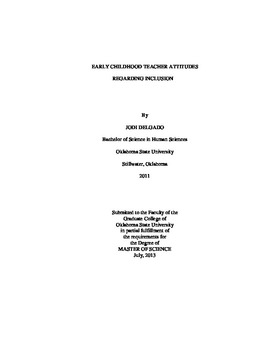| dc.contributor.advisor | Atiles, Julia T. | |
| dc.contributor.author | Delgado, Jodi Michelle | |
| dc.date.accessioned | 2014-09-24T14:18:29Z | |
| dc.date.available | 2014-09-24T14:18:29Z | |
| dc.date.issued | 2013-07-01 | |
| dc.identifier.uri | https://hdl.handle.net/11244/11152 | |
| dc.description.abstract | Over the past 20 years, educational practices have become more inclusive of children with exceptional educational needs. As the continuum of practices has become more inclusive, early childhood teachers have taught more children with exceptional educational needs in their regular education classrooms. The purpose of this research was to determine if early childhood teachers in an inclusive setting with a high ratio (29% or more) of children with exceptional educational needs to typically developing children differ in their attitudes toward inclusion from teachers in an inclusive setting with a lower ratio (up to 28%). In addition, this study investigated if there a difference between the attitudes of teachers regarding inclusion and teachers' level of education, and/or if there is a difference between the attitudes of teachers regarding inclusion years of teaching experience. Thirty-six early childhood teachers from a Midwestern state completed the "My Thinking About Inclusion Scale" and a demographic questionnaire. Based on Bandura's social learning theory, an individual's performance is influenced by the individual's perceived ability. Therefore, teachers' beliefs in their ability to practice inclusion could affect their success in doing so. While laws and policies are in favor of inclusion of students with exceptional educational needs being educated in the least restrictive environment, few schools utilize a fully-inclusive educational environment. Results of this study indicated no significant difference in teachers' attitudes towards inclusion based on a classroom setting characterized by a high ratio of children with exceptional educational needs to typically developing peers. In addition, this study revealed no relationship between the attitudes of teachers regarding inclusion and teachers' level of education or years of teaching experience. However, the study revealed through emergent anecdotal evidence that there was a great deal of inconsistency in teachers' knowledge of terminology regarding inclusion and services for exceptional learners. Based on these emergent findings, general education teachers could benefit from professional development regarding the terminology, benefits of inclusion, and strategies that may help implement inclusive practices. | |
| dc.format | application/pdf | |
| dc.language | en_US | |
| dc.publisher | Oklahoma State University | |
| dc.rights | Copyright is held by the author who has granted the Oklahoma State University Library the non-exclusive right to share this material in its institutional repository. Contact Digital Library Services at lib-dls@okstate.edu or 405-744-9161 for the permission policy on the use, reproduction or distribution of this material. | |
| dc.title | Early Childhood Teacher Attitudes Regarding Inclusion | |
| dc.type | text | |
| dc.contributor.committeeMember | Tate, Amy | |
| dc.contributor.committeeMember | Jones, Jennifer L. | |
| osu.filename | Delgado_okstate_0664M_12930.pdf | |
| osu.accesstype | Open Access | |
| dc.description.department | Human Development & Family Science | |
| dc.type.genre | Thesis | |
